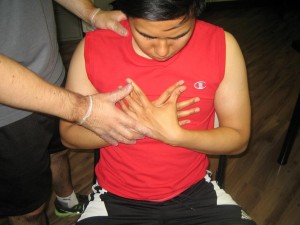
A heart attack is one of the most hazardous health conditions because it happens without warning and can be deadly if not attended to instantly. The reason for heart attacks is due to an inadequate blood supply to the heart for a certain amount of time. As a consequence, the heart muscle is partly destroyed. It is commonly thought that a heart attack is often activated by anxiety or demanding physical activity.
Symptoms of a Heart Attack
- Extreme sweating
- Chest pain
- Fatigue and shortness of breath
- Tenderness in other parts of the body.
Reaction Time
Swift action is vital in case of a heart attack because it can boost the patient’s possibility of survival and diminish the damage done to the heart. Settle the person down and talk with the person. Describe to him or her that they should remain unruffled and relax.
Call for the paramedics if the person is unconscious or does not react, then instantly begin performing CPR. If you are not qualified doing CPR, you’d better pass over mouth-to-mouth breathing and do only chest compressions. They ought to be about 100 per minute. Being endorsed in CPR and First Aid doesn’t only help you, but everyone surrounding you because you never know when CPR will be required.
